JUDICIAL COUNCIL BIOGRAPHIES

Judicial Council Chair
Judge Diarmuid O’Scannlain
U.S. COURT OF APPEALS, NINTH DISTRICT, US
Judge O’Scannlain was appointed United States Circuit Judge for the Ninth Circuit by President Reagan on September 26, 1986. He received a J.D. degree in 1963 from Harvard Law School and a B.A. in 1957 from St. John’s University. He also earned the LL.M. (Judicial Process) degree at the University of Virginia Law School in 1992. He was awarded the LL.D. (honoris causa) degree by the University of Notre Dame in 2002, the LL.D. (honoris causa) degree by Lewis & Clark College in 2003 and the LL.D. (honoris causa) degree by the University of Portland in 2011. As a judge on the U.S. Court of Appeals for the Ninth Circuit, Judge O’Scannlain has participated in over 11,000 federal cases and has written hundreds of published opinions on a broad range of subjects including constitutional law, international law, securities law, administrative law, and criminal law. He hears appeals in San Francisco (court headquarters), as well as in Los Angeles (Pasadena), Portland, Seattle, Anchorage, and Honolulu. The late Chief Justice Rehnquist appointed Judge O’Scannlain Chairman of the Federal Judicial Center’s Advisory Committee on Appellate Judge Education. In 2009, Chief Justice Roberts appointed Judge O’Scannlain to the International Judicial Relations Committee of the U.S. Judicial Conference and subsequently appointed him Chairman (2010 – 2015). On December 31, 2016, Judge O’Scannlain assumed senior status. President George W. Bush appointed Judge O’Scannlain to the Board of Trustees of the James Madison Memorial Fellowship Foundation in 2004. Pope Benedict XVI conferred the Order of Saint Gregory the Great on Judge and Mrs. O’Scannlain in 2007. The Society of King’s Inns (Dublin, Ireland) elected Judge O’Scannlain an Honorary Bencher in 2016. Judge O’Scannlain’s professional interests also include judicial administration and reform and continuing legal education. Judge O’Scannlain is former Chair of the Judicial Division of the American Bar Association and has previously chaired the ABA’s Appellate Judges Conference, its Committee on Appellate Practice, and its 9th Appellate Practice Institute. He has testified before the Senate Judiciary Committee on several occasions, the House Judiciary Subcommittee on Courts and Intellectual Property, and the Commission on Structural Alternatives for the Federal Courts of Appeals on the subject of court reorganization. Judge O’Scannlain has been an adjunct professor of law at Lewis and Clark law school for over 20 years. In addition to serving as a faculty member at numerous federal appellate practice seminars for judges and attorneys, including New York University Law School’s Institute for Judicial Administration, he is the current Chairman of the Judicial Council of the International Association of Law Schools. He has served as a Moot Court Judge at distinguished law schools across the United States including Harvard, Yale Stanford, Boalt Hall (Berkeley Law), Virginia, Cornell, Notre Dame, Duke, Fordham, Alabama, University of Southern California, King Hall (U.C. Davis) and Loyola Marymount University and in China at Xiamen and Renmin Universities and the Kenneth Wang School of Law in Suzhou, China.
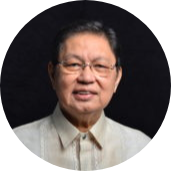
Justice Arturo Brion (ret.)
Supreme Court of the Philippines, Philippines
Justice Arturo D. Brion (ret.) is one of the fourteen Associate Justices of the Supreme Court of the Philippines. He obtained his law degree from the Ateneo de Manila University, graduating as Cum Laude and Class Valedictorian of 1974. He engaged in private law practice soon after admission to the Bar and became a partner in one of the oldest law firms in the country. From there, he entered the public service and served in all three branches of the Philippine government. In 1984, he was elected as a member of the National Assembly. The son of a retired judge, he eventually followed his father’s footsteps and joined the Judiciary in 2003 as Associate Justice of the Court of Appeals. Because of his experience and expertise in labor law, he was appointed Secretary of Labor and Employment in 2006, but he thereafter returned to the Judiciary in 2008, this time as an Associate Justice of the Supreme Court. Justice Brion obtained his Master of Laws degree from Osgoode Hall Law School of York University in Toronto, Canada. Whether in private law practice or in public service, Justice Brion generously shared his legal knowledge by joining the academe. He mainly handled public law subjects, among them, political, constitutional, labor and employment laws. He taught at the University of the Philippines School of Labor and Industrial Relations, the Far Eastern University Institute of Law, and the Ateneo de Manila University School of Law. As a Member of the Supreme Court, he has been active in the Court’s internal committees, among them, the Committee on the Rules on Financial Rehabilitation & Insolvency; the Integrated Bar Oversight Committee; the Library & Computerization Committee; and the Internal Rules Committee. In 2013, he served as Chairman of the Bar Examinations Committee, and this experience allowed him to observe and to take stock of the Philippine legal education situation.

Justice Marc de Werd
Amsterdam Court of Appeal, Netherlands
Marc de Werd (1962) is a judge in the Amsterdam Court of Appeal in the Netherlands (Criminal law division) and professor of Court Administration at the Faculty of Law of Amsterdam University. Marc de Werd has a Ph.D. in constitutional law (1994) and has published extensively in the field of European and human rights law. He is a member of the CCJE (Consultative Council of European Judges) at the Council of Europe.

Judge Francesca Fiecconi
Supreme Court of the Italy, Italy
Francesca Fiecconi, Judge of the Supreme Court of Italy, was born in Ancona, Italy, and lives in the North region of Lombardy, Milan, Italy. In 1984 graduated 110 cum laude at Pavia University, Faculty of Law. In 1986, after a public national examination, she has been lifetime appointed as a judge of the Italian Judiciary. In 2017 she has been promoted as Judge of the Italian Supreme Court, Rome, attached to the third civil and commercial chamber where she works at present. Working Experience: 1982-1983 Loyola School of Law alumna, Chicago, USA 1982-1983 (first-year exams) 1985: traineeship at the federal Court of Cleveland, Judge Manos office, USA. 1986-2001: Judge of first instance Court, Tribunal di Milano. 2001- 2011: Judge of commercial first instance court, Tribunal di Milano. 2011- 2012: European Court of Justice, traineeship as National Judge. 2010-2017 Judge of Milan Court of Appeal, civil and commercial chambers. 2017: Judge of the Supreme Court, civil and commercial chamber. 2012 to date: professor under contract at the Department of Jurisprudence, Università Statale di Milano, Commercial and European Law, Master Classes for public examinations.
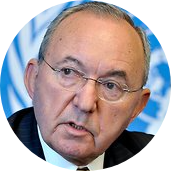
Judge Richard Goldstone (ret.)
South African Constitutional Court, South Africa
Richard J. Goldstone was a judge in South Africa for 23 years, the last nine as a Justice of the Constitutional Court of South Africa. Since retiring from the bench, he has taught as a visiting professor in a number of United States and European Law Schools. From August 1994 to September 1996 he was the chief prosecutor of the United Nations International Criminal Tribunals for the former Yugoslavia and Rwanda. He is an honorary member of the Association of the Bar of the City of New York and a foreign member of the American Academy of Arts and Sciences. He is an Honorary Bencher of the Inner Temple, London. He is the Honorary President of Human Rights Institute of the International Bar Association. The awards he has received include the International Human Rights Award of the American Bar Association (1994) and the International Justice Award of the John D. and Catherine T. MacArthur Foundation and in December (2009).
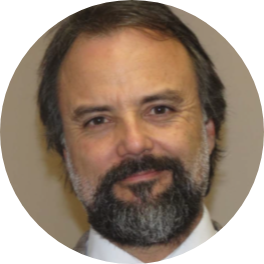
Judge Juan José Romero Guzmán
Constitutional Court of Chile, Chile
Judge, Constitutional Court of Chile (2013-2022). Judge Romero Guzmán is currently Professor of Law (Constitutional and Economic Law), Law Faculty at Pontificia Universidad Católica de Chile. His main areas of research and publications: economics and constitutional law, law, and politics of regulation, and competition law. He received his JSD (Ph.D.) from Law Faculty, Universidad de Salamanca, Spain, and his Master of Science in Regulation, The London School of Economics and Political Science, University of London, England. He was awarded his JD (LLB) at Law Faculty, Pontificia Universidad Católica de Chile. He holds an Advanced Academic Certificate in Business and Management (ESAE), Business School, Pontificia Universidad Católica de Chile, and an Advanced Academic Certificate in “Legal and Economic Aspects of Corruption”, Universidad de Salamanca, Spain. Judge Romero Guzmán is a Former Member of the European Commission for Democracy through Law (Venice Commission) and Chair of the Sub-Commission for Latin America of the same organization (2013-2017). He was Deputy Judge, Competition Court (2008-2013) and Member of the Infrastructure Academic Council, Secretary of Infrastructure (2010-2013). He served as Director of the Graduate School, Law Faculty, Pontificia Universidad Católica de Chile (2010-2013). He was a Member of the Adviser Council of the Presidential Commission for the Modernization of State Regulatory Institutions (1998). He received a Recognition Award for Teaching Excellence 2008, social sciences area, granted by the Pontificia Universidad Católica de Chile. Judge Romero Guzmán is an author of numerous academic publications.

Justice John Hedigan (ret.)
The High Court of Ireland, Ireland
Justice Hedigan (ret.) was educated at Belvedere College, Trinity College Dublin, and King’s Inns. He was called to the Bar of Ireland in 1976, to the Bar of England and Wales (Middle Temple) in 1986, and to the Bar of New South Wales in 1993. He was called Senior Counsel in 1990. He is a Bencher of Kings Inns. He practiced largely in administrative, constitutional, and commercial law. In 1998 he was elected a Judge of the European Court of Human Rights by the Parliamentary Assembly of the Council of Europe. He served there until the President appointed him in 2007 to the High Court of Ireland. At the European Court of Human Rights, he was Vice President of the Third Section. The Court of Human Rights is composed of five sections. On the Strasbourg Court, he heard cases from the 47 countries that make up the Council of Europe, composing over 800 million people. The Court in Strasbourg sits in chambers of seven and a Grand Chamber of seventeen. It hears cases from those within the jurisdiction of the 47 countries who allege their rights have been violated under the European Convention on Human Rights. It is the authoritative voice on Human Rights Law in Europe and throughout the world, its decisions are relied upon. On the Court in Strasbourg, he was Chair of the Committee on Status and Conditions of Judges, of the Information Technology Committee, and of the Languages Committee. He also sat on the Rules Committee and the Library Committee. At the High Court in Ireland, he worked on judicial review, jury trials, and the commercial court. In September 2016 he was appointed by the President to the Court of Appeal. This recently-created court has full appellate jurisdiction from all decisions of the High Court and Central Criminal Court. Judge Hedigan sits on the Executive Board of The Courts Service of Ireland and the Executive Board of the European Networks of Councils of the Judiciary. He is a member of the Judicial Council of the International Association of Law Schools.
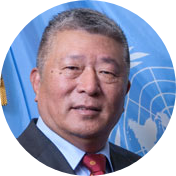
Judge Daqun Liu
International Residual Mechanism for Criminal Tribunals, Netherlands
Judge Liu Daqun is a judge in the Appeals Chamber for both the ICTY and ICTR and for the Mechanism for International Criminal Tribunals. He was appointed as an ICTY judge by the United Nations Secretary-General in 2000 and re-elected by the General Assembly in 2001 and 2004. From 2001 until 2005, Judge Liu was the Presiding Judge of Trial Chamber I presiding over the Naletilić and Martinović, Blagojević and Jokić, and Halilović cases, amongst others. He is also a member of the Permanent Court of Arbitration and the Institute de Droit International. Since 2005, Judge Liu has worked on appeals from both the Tribunal and the ICTR where he presided over the Šainović et al case before the ICTY and Gatete case before the ICTR. Judge Liu is a member of the Appeals Chamber in all three current ICTY Appeals cases (Stanišić and Simatović, Stanišić and Župljanin and Prlić et al). Prior to being elected to the Tribunal, Judge Liu held a variety of positions in the Chinese Foreign Ministry, culminating in his appointment in 1999 as Ambassador of the People’s Republic of China to Jamaica and as Permanent Representative of the People’s Republic of China to the International Seabed Authority. Judge Liu was also Deputy Head and Chief Negotiator of the Chinese Delegation to the Rome Conference on the establishment of the International Criminal Court. Judge Liu has enjoyed a distinguished academic career. In 1994 he was appointed a Professor of International Law at China’s University of Law and Political Science and a Professor at the Centre of Cooperative Innovation and Judicial Civilization of that University in 2013. He regularly lectures across China and internationally on international criminal law. Amongst others, Judge Liu holds positions at the Law School of Wuhan University (since 1997) and China Foreign Affairs University (since 1998).
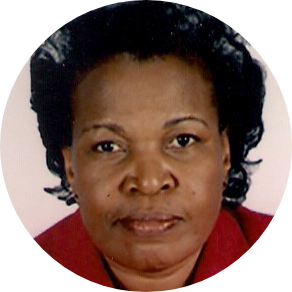
Justice Esther Kisaakye
Supreme Court of Uganda
Hon. Justice Dr. Esther Kisaakye Kitimbo is a Justice of the Supreme Court of Uganda. She is the Chairperson of the Uganda Judicial Training Committee and the President of the National Association of Women Judges in Uganda. She holds a Bachelor of Laws Degree (LL.B Hons. – Upper Second) Division, an LL.M from Georgetown University Law Center, Washington, D.C., and a Doctorate (SJD) from the Washington College of Law, American University, U.S.A. She is also a former Fellow of the Law and Advocacy for Women Fellowship Program of the Georgetown University Law Center, Washington, D.C. Prior to her appointment to the Bench, Justice Kisaakye Kitimbo taught law at Makerere University, Kampala, Uganda, practiced as an Attorney and as a Consultant for Civil Society organizations and several UN Agencies from 1985 – 2009. She co-edited the Human Rights of Women and African Experiences, (Nowak M, Kisaakye E, Oberlietner G. (Eds.), Zed Books, 2002. Her working experience spanning over the last 33 years mainly focused on human rights; women’s rights; gender, employment, and the law; family law; health law; HIV/AIDS, and the law. Justice Kisaakye Kitimbo also served as a Legal Advisor to the Vice President of Uganda, and as Executive Director of the Uganda Network on Law, Ethics & HIV/AIDS (UGANET). She has held several leadership positions in Constitutional Commissions, the Judiciary, Civil Society, and other community organizations, as well as professional bodies in Uganda and beyond. These include the Judicial Service Commission of Uganda, the Uganda AIDS Commission, the AIDS Support Organization (TASO); the National Forum of People Living with HIV/AIDS in Uganda (NAFOPHANU), Uganda, the Uganda Association of Women Lawyers (FIDA-Uganda), the Uganda Network on Law, Ethics & HIV/AIDS, the Uganda Law Society, and Rotary International.
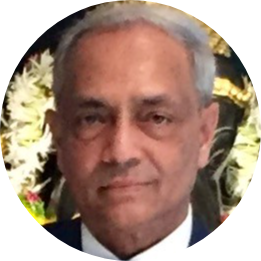
Chief Justice Mohan Pieris (ret.)
Supreme Court of Sri Lanka, Sri Lanka
Justice Mohan Pieris (ret.) received his secondary education at St. Joseph’s College and Royal College, Colombo. He received his tertiary education at the Sri Lanka Law College. He was admitted as an Attorney-at-Law to the Supreme Court of Sri Lanka in 1975 and as Solicitor of the Supreme Court of England and Wales in 1978. In 1981 he joined the Attorney-General’s Department as a State Counsel and retired as Senior State Counsel in 1996. During this time he was trained in Trial Advocacy at the National Institute for Trial Advocacy at its Teacher Training Trial Advocacy Workshop at Harvard Law School, Economic Crime at the Centre for Police and Criminal Justice Studies University of Exeter / Jesus College Cambridge, Project Management for Development Foreign Investment Analysis and Negotiation, International Business with the Department of the Agency for International Development of the United States of America and George Washington University. He practiced for a period of 15 years in civil, public law, and arbitration. He has been on several Sri Lanka delegations to international forums: The United Nations Human Rights Council, United Nations Environmental Program, South Asian Agency for Regional Co-operation in Law, and Tariff Negotiations with the European Commission. He was appointed Attorney-General of Sri Lanka in 2008, Senior Legal Advisor to the Cabinet of Ministers in 2011 and appointed Chief Justice of the Supreme Court on 15th January 2013. He relinquished office on 28th January 2015 and is presently Honorary Professor of Law of the National Law University New Delhi, Visiting Professor of the Rajiv Gandhi National Law University Punjab, and a Visiting Lecturer to the National Law Universities of Bangalore, Assam, Orissa, Kochi, and in the Symbiosis Law School, Pune, India. He was the Chairman of the Council of Legal Education from 2013 to January 2015.

Lord Justice Sir Ernest Ryder
Court of Appeal of England and Wales, United Kingdom
Sir Ernest Ryder started his role as the Senior President of Tribunals on 18 September 2015. He was educated at Bolton School and Peterhouse, Cambridge. He was a merchant banker with Grindley Brandt & Co. and is a commissioned officer in the Duke of Lancaster’s Own Yeomanry (TD, 1996). He was called to the Bar by Gray’s Inn in 1981 and was made a Bencher in 2004. He was appointed Queen’s Counsel in 1997, Assistant Recorder in 1997, Recorder in 2000, and Deputy High Court Judge in 2001. He was Counsel to the North Wales Tribunal of Inquiry, 1996–99, and an Assistant Boundary Commissioner, 2000–04. He was appointed a Judge of the High Court of Justice, Family Division on 4 May 2004 and was the Family Division Liaison Judge and then the Presiding Judge of the Northern Circuit. He was the Judge in Charge of the Modernisation of Family Justice, 2011-12 and was appointed a Lord Justice of Appeal and privy councilor in 2013. He is the Head of Deployment Strategy. He is a Deputy Lieutenant of Greater Manchester, a trustee of the Nuffield Foundation, and Chancellor of the University of Bolton.
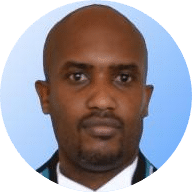
Justice Emmanuel Ugirashebuja
President of East African Court of Justice Tanzania, Tanzania
Judge Dr. Emmanuel Ugirashebuja has developed experience of a far wider range, from being an international judge, practitioner, and international law scholar, and as a result, he is well equipped to contribute to the fulfillment of the mission of the International Court of Justice as a Judge. PhD in Law University of Edinburgh, LLM in Law University of Edinburgh (Public International Law and International Relations, International Economic Law, International Environmental Law), Degree in Law (University of Rwanda). President of the East African Court of Justice (June 2014- November 2020): The Court is established by the Treaty Establishing the East African Court of Justice has jurisdiction over six East African Countries, namely, Republic of Burundi, Republic of Kenya, Republic of Rwanda, Republic of South Sudan and the United Republic of Tanzania, Republic of Uganda; Presiding Judge of the East African Court of Justice Appellate Division (June 2014-November 2020); Judge of the East African Court of Justice (November 2013- November 2020); President of the East African Court of Justice Arbitration Tribunal (June 2014- November 2020); Chair of the East African Court of Justice Rules Committee (June 2014-November 2020); Member of the East African Chief Justices Forum (June 2014-November 2020); Member of the Commonwealth Magistrates and Judges Association (2014- to present); Member of the East African Magistrates and Judges Association (2014-to Present); Member of the Interim Governing Committee of the Global Judicial Institute on the Environment (2016- present); Member of the Rwandan Superior Council of Judiciary (2009-2013); Rwandan Supreme Council of Prosecution (2009-2013). Dean of the Faculty of the Law National University of Rwanda/now University of Rwanda (2009-2014), Professor of Public International Law and International Organisations, Environmental Law, International Economic, Trade and Financial Law, University of Rwanda (2008- 2014).
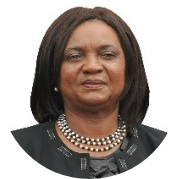
Honorable Chief Justice Georgina Wood (ret.)
Supreme Court of Ghana, Ghana
The Hon. Lady Chief Justice, Mrs. Georgina Theodora Wood, (ret.) is the first female Judge to head Ghana’s Judiciary, an institution to which she has devoted nearly forty years of her life. Since becoming Chief Justice in 2007, she has put several programs into action to achieve her goal of reforming Ghana’s judicial system. Under her leadership, she has ensured that judicial independence has been underpinned by the core values of integrity, propriety and incorruptibility, impartiality, equality, transparency, diligence, and competence. As a firm believer in continuing judicial education, Chief Justice Wood has also sought opportunities in leading universities in the U.S. and the U.K. in particular, for post-graduate studies (LLM) for Ghana’s Judiciary in relatively newer areas of the Law such as Oil and Gas, ICT, Taxation, International Law and Justice, Intellectual Property and Maritime Law to build the capacity of judges and enhance their professional development.
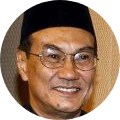
Chief Justice Azmi Zaki (ret.)
Dubai International Financial Centre Courts, United Arab Emirates & Former Chief Justice of Malaysian Judiciary, Malaysia
The Honourable Tun Dato’ Seri Zaki Tun Azmi (ret.) read law in the Lincoln’s Inn, London, and obtained a Barrister-at-Law in 1969. Tun Dato Seri. Zaki Tun Azmi came from a family of lawyers. His father was the first in the line of Azmi lawyers. His deceased brother was the next which was followed by him. His son and daughter-in-law are lawyers too. His wife happens to be a first-class student from the International Islamic University Malaysia and is now a housewife. His father was the second Malay Chief Justice of Malaysia, then known as the Lord President (1968 to 1974). Upon graduation, his Lordship started his career with the Attorney General’s Chambers from December 1969 to 1970. He was thereafter appointed as a Magistrate in 1970 and in 1971 as a President of the Session Court. In 1973, his Lordship was appointed as a Federal Counsel at the Drafting Division in the Attorney General’s Chamber and later in 1976, as a Senior Counsel at the Ministry of Home Affairs. In 1985, his Lordship made his way into legal practice as an advocate and solicitor of the High Court until 2006 when he then resigned as a partner. After having been in practice with an established law firm he was invited to be elevated to the bench as a Federal Judge. Prior to being in practice, he was in the Malaysian Judicial and Legal Service for 15 years, joining as a Magistrate and then later transferred to the Attorney Generals Chambers where he held several positions until he resigned to go into practice. While in practice he also sat on several public listed companies as a director as well as chairman or member of Board Audit Committees. Amongst which he participated were PETRONAS (the national oil company, which today has spread it wings throughout the world), Malaysia Airport Berhad, and SP Setia. Perhaps it was this management experience that the CJ brought into the Judiciary to make it what it is today. After holding office as a Federal Judge for a few months he was appointed as the President of the Court of Appeal, the second-highest judicial office. On 18th October 2008, he was appointed to be the 12th Chief Justice of Malaysia. With the establishment of the Judicial Appointment Commission, he became the first Chairman since 16th February 2009. During his period as the Chief Justice, Tun Zaki has made important reforms in the judiciary system in Malaysia. He managed to substantially reduce the backlog of cases pending at the Malaysian courts as well as introduce a technological and managerial system that enables cases at the High Court to be disposed of within nine months to one year from the date of filing and at the Sessions Court and Magistrate’s court within six months. He is currently the Chief Justice of Dubai International Financial Centre Courts.
